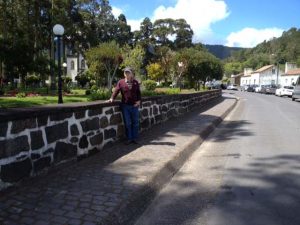Transatlantic Traveling Great for Reading
I’ve just returned from a repositioning cruise with Holland America Cruise Lines as it changed its operations from the Caribbean to the Mediterranean for the season. The price was right. The cruise began in Fort Lauderdale and ended in Rome with stops in the Azores and Spain (Málaga and Aliconte).
Azores? How else were we ever going to see the Azores? Actually, we spent the day in only one of these  nine Portuguese islands, the largest, named Sao Miguel. Like Hawaii, the islands are volcanic in origin and Sao Miguel is green and mountainous. Tea and pineapple are major crops.
nine Portuguese islands, the largest, named Sao Miguel. Like Hawaii, the islands are volcanic in origin and Sao Miguel is green and mountainous. Tea and pineapple are major crops.
I looked forward to the nine sea days of this cruise as a chance to edit my latest manuscript and to begin plotting my next one. I had the best intentions, but the daily schedule at sea included lectures and port talks that were too interesting to miss and, of course, I didn’t miss one of those leisurely meals meeting people from other parts of the world. So I got very little accomplished.
Having traveled on Holland America before, I knew they had a well-stocked library of hard-bound books for borrowing, and it was also a quiet place to read. Rethink. This was a new ship and there was no library. No library? Many people commented on this in dismay, which was heartening for an author but couldn’t dispel the depressing thought that the Holland America folks thought people no longer wanted books to read on a long voyage. Then I learned that there was a nook up in the Crow’s Nest (a lounge on the top deck) for a book exchange. Actually, a book exchange of paperbacks people were reading seemed like a better idea than polished shelves of pristine hardbacks, so I’m okay with this innovation. The Crow’s Next was kept quiet for us readers and others who wanted a quiet place to watch the sea, read, or doze.
Book exchanges seem to be cropping up in unusual places. In St. Petersburg, Florida, we found small kiosks for book exchanges in people’s yards around town. Take one. Leave one. In Mexico Beach, Florida, a small gulf town on the panhandle we found a city building that contained a room full of books as an open book exchange. And in Malaga, I came across an old-fashioned British-type walk-in phone booth that had been turned into a book exchange.
Fortunately, I brought my handy e-reader stocked with books on the cruise. I included Provenance by Donna Drew Sawyer, which won first prize in the 2017 Maryland Writers Association book awards contest. This year MWA members voted on the submissions in four categories: literary/mainstream, thriller/mystery, historical and science fiction/fantasy.
Provenance begins in a small southern town in Virginia. Three young black men are attacked by the sheriff and his deputies. The sheriff suffers a heart attack which is blamed on one of the men who runs for his life, escaping to Richmond. Because he can pass for white he realizes that the only way to save himself is to become a white man. The years pass. Henry Whitaker becomes a wealthy man, a wealthy white man, as his janitorial business grows. Enter Margaret Bennett the young headstrong and beautiful daughter of prominent banker William Bennett and his wife Charlotte who has social ambitions for her daughter.
Despite Charlotte’s strong objections and Henry’s own concerns about his African American heritage, he and Margaret marry. When Margaret becomes pregnant, Henry wonders if he will be found out by the birth of a son who reveals Henry’s true heritage. How long can Henry’s charade last? How many generations?
The book is an engaging read and a thought-provoking look at the unspeakable oppression suffered by African Americans, the soul-searching lonely path suffered by those who find they can pass for white, and a character study of Charlotte, a cruel, self-serving woman who, in the end, makes a generous gesture that reveals her own secret while giving Henry a future. 5 Stars.
Eileen McIntire
Eileen has ridden a camel in the Moroccan Sahara, fished for piranhas on the Amazon, sailed in a felucca on the Nile, and lived for three years on a motorsailer, exploring the coast from Annapolis to Key West. Eileen has many years experience writing, editing and designing all manner of publications for nonprofits and professional associations. She is now co-owner of Summit Crossroads Press, which publishes books for parents, and its fiction imprint, Amanita Books. The inspiration for her 90s Club mystery series springs from meeting a slim, attractive woman at a pool party who was the only one actually in the pool swimming laps, and she was 91 years old. Since then, Eileen has collected articles about people in their 90s—and 100s—who are still active, alert and on the job. She often speaks at retirement villages on “Old Dogs, New Tricks.”